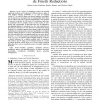Free Online Productivity Tools
i2Speak
i2Symbol
i2OCR
iTex2Img
iWeb2Print
iWeb2Shot
i2Type
iPdf2Split
iPdf2Merge
i2Bopomofo
i2Arabic
i2Style
i2Image
i2PDF
iLatex2Rtf
Sci2ools
TIT
2016
2016
Non-Signaling Parallel Repetition Using de Finetti Reductions
—In the context of multiplayer games, the parallel repetition problem can be phrased as follows: given a game G with optimal winning probability 1 − α and its repeated version Gn (in which n games are played together, in parallel), can the players use strategies that are substantially better than ones in which each game is played independently? This question is relevant in physics for the study of correlations and plays an important role in computer science in the context of complexity and cryptography. In this paper, the case of multiplayer non-signaling games is considered, i.e., the only restriction on the players is that they are not allowed to communicate during the game. For complete-support games (games where all possible combinations of questions have non-zero probability to be asked) with any number of players, we prove a threshold theorem stating that the probability that non-signaling players win more than a fraction 1−α+β of the n games is exponentially small in nÎ...
| Added | 11 Apr 2016 |
| Updated | 11 Apr 2016 |
| Type | Journal |
| Year | 2016 |
| Where | TIT |
| Authors | Rotem Arnon Friedman, Renato Renner, Thomas Vidick |
Comments (0)

